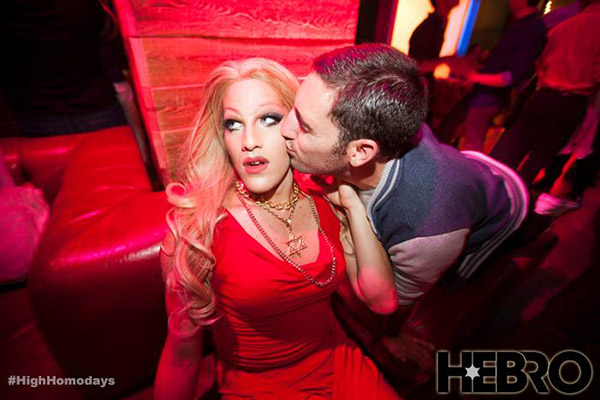
Oy! Orthodox Jewish drag queens use humor to reconcile religion with alternate lifestyle
- By Alison Lesley --
- 27 Mar 2015 --

Drag queens of New York City are receiving a surprising infusion of characters from the religious sector.
Imagine being an Orthodox Jew who realizes he is gay, and that he feels most comfortable in the skin of a flamboyant, outspoken Jewish matriarch. For a growing community, this double departure from the acceptable norm makes the experience that much more difficult to come out about—yet irresistibly appealing.
One of the newer arrivals on this scene, Lady SinAGaGa first performed as the headline host of a Jewish High Homo Days party in New York last September. She had been out of the closet less than a year, and received advice and support for her first drag queen performance from veteran Silvia Sparklestein. The two characters, performed by local Orthodox Jews Moshiel and Yudi K, represent a growing subculture within the drag queen community of characters who are themselves culturally Jewish. The songs, jokes, and commentary are largely riffs on the Jewish lifestyle.
The challenge and tension—and perhaps part of the thrill—of participating in the nightlife scene as a drag queen lies in maintaining the life of an Orthodox Jew during the day. At least nominally, Moshiel and Yudi K maintain the requirements of their religion.
Other Jewish drag queens pursue their religion to varying degrees in the daylight hours. Jinks Monsoon’s daytime persona, Jerick Hoffer, actually grew up Catholic. Later on, he developed interest in his Russian Jewish heritage and has incorporated that into both parts of his life. Keith Levy doesn’t claim more than a cultural connection with Judaism, citing gatherings with his atheist Jewish dad’s family as inspiration for his character Sherry Vine.
Officially, through a document called the Torah Declaration, Orthodoxy looks down on LGBT lifestyles as against the ideals of the religion. However, within the religion are many who affirm the value of all persons regardless of orientation, and at least attempt to sincerely welcome anyone as members of their synagogue. Those of the latter persuasion support a document called the Statement of Principles, which says, “all human beings are created in the image of God and deserve to be treated with dignity and respect.” Without affirming homosexuality as part of God’s perfect plan, this statement relating to treatment of gays further instructs that all who desire it should be “welcomed as members of the synagogue and school community.”
This growing support for respecting members of alternative lifestyles and quirky night jobs helps in a small way to provide healing for a segment of the population that has previously had to choose between living true to the instinct of their heart or adhering to their religion. The path is slowly opening up to allow people to integrate their sexual nature with their spirituality.



















